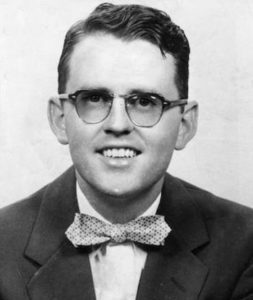
James Reeb
*On this date, in 1927, James Reeb was born. He was a white-American minister, pastor, and activist.
James Reeb was born in Wichita, Kansas, to Mae (Fox) and Harry Reeb. He was raised in Kansas and Casper, Wyoming. He attended Natrona County High School and graduated in 1945, after which he joined the Army despite the fact that his commitment to the ministry made him exempt from service. After basic training, he was sent to Anchorage, Alaska as a clerk typist for the headquarters of Special Troops. He was honorably discharged eighteen months later, in December 1946, as Technical Sergeant, Third Class.
After his time in the Army, Reeb continued his schooling. Initially, he attended classes in his hometown at Casper Junior College before moving on to St. Olaf College (Northfield, Minnesota) in 1947, where he received his A.B. cum laude in 1950. That same year Reeb married Marie Deason on August 20, 1950; they had four children. He then entered Princeton Theological Seminary, earning his B.D. in 1953. Three days later, Reeb has ordained a Presbyterian minister at the First Presbyterian Church of Casper. After this, he accepted a position at the Philadelphia General Hospital as Chaplain to Hospitals for the Philadelphia Presbyter.
As a scholar of theology, Reeb grew away from traditionalist Presbyterian teachings and was drawn to the Unitarian Universalist church. 1957, he resigned from his Presbyterian Chaplaincy and contacted the American Unitarian Association about transferring his fellowship from Presbyterian to Unitarian. Reeb appreciated the church's emphasis on social action and became active in the American Civil Rights movement. Beginning in his new ministry, Reeb encouraged parishioners to participate in the movement as well. With his wife and four children, he lived in poor Black neighborhoods where he felt he could do the most good. From 1957-59, he took a job that would allow him to work closely with Philadelphia's poor community as a youth director for the West Branch Y.M.C.A. While there, he abolished the racial quota system and started an integrated busing program to transport youth to and from the location.
When he was granted a preliminary fellowship by the Unitarians, he accepted an offer to be an assistant minister of All Souls Church in Washington, D.C. After three years of active service at All Souls Church, Reeb was fully ordained as a Unitarian Universalist minister in 1962. In 1964, he began as community relations director for the American Friends Service Committee's Boston Metropolitan Housing Program, focusing on desegregation. At the AFSC, Reeb and his staff advocated for the poor. They pressed the city to enforce its housing code, protecting the rights of tenants of all races and backgrounds, particularly poor African and Hispanic Americans. The Reebs were one of the few white families living in Roxbury. James Reeb's daughter Anne recollected that her father "was adamant that you could not make a difference for African Americans while living comfortable in a white community."
As a member of the Southern Christian Leadership Conference (SCLC), Reeb went to Selma to join the Selma to Montgomery marches. On March 9, Reeb and two other Unitarian ministers were beaten by white men with clubs for their support of African American rights. The Black hospital in Selma did not have the facilities to treat him, and the white hospital refused. James Reeb went into a coma and died two days later, on March 11, 1965, from his injuries. Three men were tried for his murder, but no one was ever convicted. His murder remains officially unsolved. His death resulted in a national outcry against the activities of white racists in the Deep South.